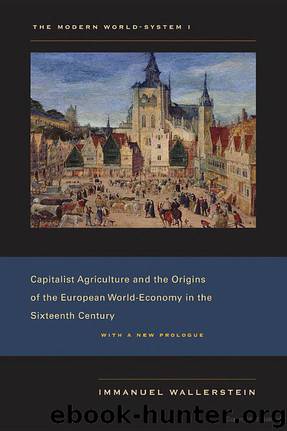The Modern World-System I: Capitalist Agriculture and the Origins of the European World-Economy in the Sixteenth Century by Immanuel Wallerstein

Author:Immanuel Wallerstein [Wallerstein, Immanuel]
Language: eng
Format: epub
ISBN: 9780520267572
Amazon: 0520267575
Publisher: University of California Press
Published: 2011-06-10T04:00:00+00:00
“The basic solution for these problems was discovered by Philip Augustus (1180–1223), the king who was the real founder of the French state. He allowed each province to keep its own customs and institutions but sent men out from Paris to fill all important provincial offices. Thus Norman courts continued to enforce Norman law, but the presiding officers were not Norman but royal agents drawn largely from the old royal domain. Provincial pride was placated, while the king kept effective control of his new possessions. . . .
“(By way of contrast, the English state, with its insistence on uniform institutions and laws, had great trouble in assimilating regions which had separate political traditions, such as the principalities of Wales or the petty kingdoms of Ireland.) But the emerging French state had to pay a heavy price for its flexibility. Local leaders were primarily concerned with the preservation of local customs and privileges; they distrusted the central government just as the central government distrusted them. They could not be used, to any great extent, in the work of local administration. In fact the basic rule of French administration was that no one should hold office in his native province.” On the Medieval Origins of the Modern State, pp. 49–51.
87 “In the 15th and the 16th centuries, France failed twice on the seven seas of the world. . . . [F]ailure in the 15th century when the great discoveries were made without its sailors—or almost. Failure again in the 16th century when France. . . . gives up in the struggle for routes, islands, coasts, and profits in the Atlantic, Africa, and America. . . .
“The overriding consideration, even before the Hundred Years’ War, had been, ever since the Genoese galleys had made the successful liaison between the Mediterranean and the North Sea, the exclusion from the grand circuits of trade of the transcontinental routes and of the French economy. The Champagne fairs had lasted only a while. Now, without taking into consideration this collaboration of the general economy, I mean without in the 15th century the support of Venice or Genoa, without the complicity of Italian or Nordic international capital, how can one explain Lisbon or the seizure of Ceuta, or these roots that the Genoese were establishing in Andalusia, or much later the voyage of Magellan? Behind the Iberian good fortune there is this thrust of the 14th and 15th centuries, this complicity of international capitalism and its driving forces with Seville, Lisbon, later Antwerp, cities with linked destinies, whose linkages bypassed France. On top of all this. . . . the dramas of the Hundred Years’ War made everything worse. Made worse, but it did not create a crisis which had been set off already by the revolution in trade routes.” Fernand Braudel, “La double faillite ‘coloniale’ de la France aux XVe et XVIe siècles,” Annales E.S.C., Iv, 4, oct.-déc. 1949, 454. Perhaps it was not only the absence of external backing. Braudel concludes: “The colonial vocation calls into question the entire life, the whole structure of a country, to its very innards.
Download
This site does not store any files on its server. We only index and link to content provided by other sites. Please contact the content providers to delete copyright contents if any and email us, we'll remove relevant links or contents immediately.
International Integration of the Brazilian Economy by Elias C. Grivoyannis(110685)
The Radium Girls by Kate Moore(12018)
Turbulence by E. J. Noyes(8040)
Nudge - Improving Decisions about Health, Wealth, and Happiness by Thaler Sunstein(7694)
The Black Swan by Nassim Nicholas Taleb(7111)
Rich Dad Poor Dad by Robert T. Kiyosaki(6613)
Pioneering Portfolio Management by David F. Swensen(6289)
Man-made Catastrophes and Risk Information Concealment by Dmitry Chernov & Didier Sornette(6007)
Zero to One by Peter Thiel(5789)
Secrecy World by Jake Bernstein(4742)
Millionaire: The Philanderer, Gambler, and Duelist Who Invented Modern Finance by Janet Gleeson(4469)
The Age of Surveillance Capitalism by Shoshana Zuboff(4279)
Skin in the Game by Nassim Nicholas Taleb(4240)
The Money Culture by Michael Lewis(4198)
Bullshit Jobs by David Graeber(4179)
Skin in the Game: Hidden Asymmetries in Daily Life by Nassim Nicholas Taleb(3993)
The Dhandho Investor by Mohnish Pabrai(3760)
The Wisdom of Finance by Mihir Desai(3735)
Blockchain Basics by Daniel Drescher(3574)
